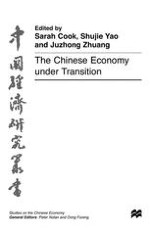2000 | OriginalPaper | Chapter
Impact of Reforms on Wage and Employment Determination in Chinese State-owned Enterprises, 1986–91
Authors : Athar Hussain, Juzhong Zhuang
Published in: The Chinese Economy under Transition
Publisher: Palgrave Macmillan UK
Included in: Professional Book Archive
Activate our intelligent search to find suitable subject content or patents.
Select sections of text to find matching patents with Artificial Intelligence. powered by
Select sections of text to find additional relevant content using AI-assisted search. powered by
Chinese economic reforms since 1979 have introduced far-reaching changes in the labour market as well as in enterprise governance. In the state sector, which is at the centre of the transition to a market economy, wage determination has gradually been devolved to managers. Incentive pay and bonuses linked to enterprise performance have became widespread and their share in the wage bill has risen steadily. Managerial discretion over recruitment, promotions and also lay-offs has increased. Terminable employment contracts are replacing jobs for life. The labour force, in turn, has acquired greater freedom in choosing and changing jobs. The determination of wages and employment, although of crucial importance for the transition to a market economy, have as yet not been investigated empirically. Studies of transformation of the state sector have largely concentrated on efficiency and productivity (Chen et al., 1988; Dollar, 1990; Jefferson, Rawski and Zheng, 1992; Woo et al., 1993; Groves et al., 1994).
